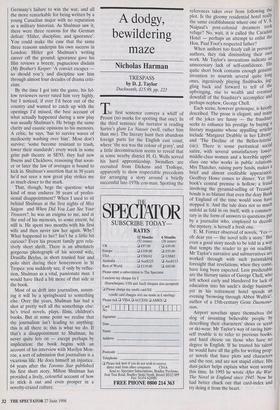A dodgy, bewildering maze
Nicholas Harman
TRESPASS by D. J. Taylor Duckworth, £15.99, pp. 223 he first sentence conveys a whiff of Proust (no marks for spotting that one). In the third sentence the narrator is reading Sartre's glum La Nausee (well, rather him than me). The literary hunt then abandons foreign parts for the English east coast, where 'the sea was the colour of gravy', and a little deconstruction seems to reveal that in some nearby district H. G. Wells served his hard apprenticeship. Swindlers are recruited from Dickens and Trollope, apparently to show respectable precedents for arranging a story around a briefly successful late-1970s con-man. Spotting the references takes over from following the plot. Is the gloomy residential hotel really the same establishment where one of V. S. Naipaul's post-colonial dreamers took refuge? No, wait, it is called the Caradon Hotel — perhaps an attempt to enlist the Hon. Paul Foot's respected father? When authors too freely call in previous authors, they risk diminishing their own work. Mr Taylor's invocations indicate an unnecessary lack of self-confidence. Fits quite short book contains enough genuine invention to nourish several quite long ones, ingeniously playing flashbacks, jug- gling back and forward to tell of the upbringing, rise to wealth and eventual downfall of the fraudster's accomplice and perhaps nephew, George Chell. Each scene, however grotesque, is keenly described. The prose is elegant, and many of the jokes are funny — the fraudster seeks to enhance his prestige by buying a literary magazine whose appalling articles, include 'Margaret Drabble in her Library, and 'The Decline of the Belles-lettnst (sic). There is some puritanical social satire, with several unsatisfactory lower' middle-class women and a horrible upper- class one who works in public relations. Mrs Thatcher, raising party funds, makes a brief and almost creditable appearance. Geoffrey Howe comes to dinner. Yet the book's central premise is hollow; a fraud involving the pyramid-selling of Treasury bonds is so blatant that even the dozy Bank of England of the time would soon have stopped it. And the tale does not so much unfold as fold in on itself, with a commen- tary in the form of answers to questions put by a journalist who, employed to decode the mystery, is herself a fresh one.
E. M. Forster observed of novels, 'Yes oh dear yes — the novel tells a story.' But even a good story needs to be told in a way that tempts the reader to go on reading. Mr Taylor's narrative and subnarratives are worked through with such painstaking foresight that revelations, when they come, have long been expected. Less predictable are the literary tastes of George Chell, who left school early and blundered for lack of education into his uncle's dodgy business, yet in his retirement hotel spends an evening 'browsing through Abbot Wulfric', author of a 15th-century Gesta Daemono- rum.
Airport novelists spare themselves the slog of inventing believable people by describing their characters' shoes or scent or ski-wear. Mr Taylor's way of saving him- self trouble is to refer to previous books, and hard cheese on those who have no degree in English. If he trusted his talent he would have all the gifts for writing prop- er novels that have plots and characters and the rest, and are not stupid either. His dust-jacket helps explain what went wrong this time. In 1993 he wrote After the War: The Novel in England since 1945. Now he had better chuck out that card-index and try doing it from the heart.


























































 Previous page
Previous page